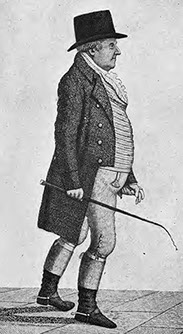
deacon brodie
The real story behind Edinburgh's most enduring legend

George Williamson Testimony
Witness number Twenty-five For the Prosecution of Deacon Brodie and George Smith
George Williamson, messenger-at-arms in Edinburgh, called in and sworn.
George Williamson — I was employed with others to search the house of the prisoner, William Brodie, on the 10th of March George Williamson from Kay's Edinburgh Portraits last, and found several keys of an uncommon construction in a room off Brodie’s shop. We likewise found a pair of pistols wrapped in a green cloth under the earth in the fireplace of a shed in the woodyard. These were discovered by Smith, the prisoner, poking with an iron. [Pistols shown to witness.] These are the same that were so found. We also found several pick-locks in Mr. Brodie’s house, all of which were lodged by me in the Sheriff-Clerk’s Office. [Here the pick-locks were shown to witness.] These are the same pick-locks that were so found. [The counsel for the panels here repeated the objection against adducing the pick-locks, as mentioned in the general objection and interlocutor before taken down.] I was sent in quest of Mr. Brodie, who was supposed to have gone to London, by Mr. Scott, the Procurator-Fiscal, upon the 11th of March last. I left Edinburgh about eleven o’clock at night. When I arrived at Dunbar I got some accounts of him; Mr. Brodie had left that place in a post-chaise. At Newcastle I was informed that he had taken the “Flying Mercury” post-coach to York; and I was afterwards informed that he had continued in it till he came to London. When I arrived in London I was informed by the coachman that Mr. Brodie did not go with the coach to the stage office, but that he had quitted it at the foot of Old Street, Moorfields. I waited upon Sir Sampson Wright, and at his desire I called upon Mr. Walker, solicitor-at-law in the Adelphi, and inquired for Mr. Brodie. He told me he was bad, and that I could not see him. I said I had a letter for him and wanted only to deliver it; but Mr. Walker replied that it might perhaps be dangerous to allow me to see him.
George Williamson from Kay's Edinburgh Portraits last, and found several keys of an uncommon construction in a room off Brodie’s shop. We likewise found a pair of pistols wrapped in a green cloth under the earth in the fireplace of a shed in the woodyard. These were discovered by Smith, the prisoner, poking with an iron. [Pistols shown to witness.] These are the same that were so found. We also found several pick-locks in Mr. Brodie’s house, all of which were lodged by me in the Sheriff-Clerk’s Office. [Here the pick-locks were shown to witness.] These are the same pick-locks that were so found. [The counsel for the panels here repeated the objection against adducing the pick-locks, as mentioned in the general objection and interlocutor before taken down.] I was sent in quest of Mr. Brodie, who was supposed to have gone to London, by Mr. Scott, the Procurator-Fiscal, upon the 11th of March last. I left Edinburgh about eleven o’clock at night. When I arrived at Dunbar I got some accounts of him; Mr. Brodie had left that place in a post-chaise. At Newcastle I was informed that he had taken the “Flying Mercury” post-coach to York; and I was afterwards informed that he had continued in it till he came to London. When I arrived in London I was informed by the coachman that Mr. Brodie did not go with the coach to the stage office, but that he had quitted it at the foot of Old Street, Moorfields. I waited upon Sir Sampson Wright, and at his desire I called upon Mr. Walker, solicitor-at-law in the Adelphi, and inquired for Mr. Brodie. He told me he was bad, and that I could not see him. I said I had a letter for him and wanted only to deliver it; but Mr. Walker replied that it might perhaps be dangerous to allow me to see him.
The Dean of Faculty — My Lords, without meaning any reflection on the witness, whom I know and believe to be a very good man and an active officer, the greatest part of what the witness says is “hearsay.” He tells your Lordships that he was told one thing at Dunbar; that he received another piece of information at Newcastle; that a coachman told him so-and-so in London, and that Mr. Walker said this, that, and the other thing. My Lords, this is exceedingly improper. I have been taught to understand that in criminal trials the best evidence that can be got ought always to be brought; and surely it will not be pretended that that has been done in the present case. In a question of this kind, hearsay evidence is not admissible. The witness has said that he was informed so-and-so by coachmen; why were not these coachmen called as evidences? He has given you an account of a conversation that passed between him and Mr. Walker; why is not Mr. Walker brought here to speak for himself?
The Lord Advocate — My Lords, it was thought a material circumstance to be proved that the prisoner, William Brodie, fled from this country; that he secreted himself in London; and the witness, who was sent in pursuit of him, was considered as a proper person to be examined as to the fact. In the course of informing the Court what he himself did he has necessarily mentioned what passed between himself and some other persons. This cannot be said to have been hearsay evidence, being what the witness himself knows.
My Lords, the Dean of Faculty has asked why the different post-boys and coachmen who drove the prisoner to London, why Mr. Walker and others were not all cited as witnesses? The bringing forward of such a variety of witnesses is not only unnecessary but expensive. By the forms of criminal procedure in this country a trial must be finished at one sederunt; but, my Lords, if the mode contended for by the Dean of Faculty had been pursued in the present case this trial could not have been finished in a month.
The Lord Justice-Clerk — George Williamson, you will confine yourself to what you know or did yourself, and do not speak of what you were told by others.
George Williamson — I searched for the prisoner in London, but could not find him. I also went out to Deal and Dover, but could receive no intelligence of him. Accounts were afterwards brought to this place that he had been apprehended in Holland and brought to London. I went to London for him. He was delivered over to me at Tothilfields Bridewell, and I conducted him to this place and lodged him in the Tolbooth.
Contact us
Notices